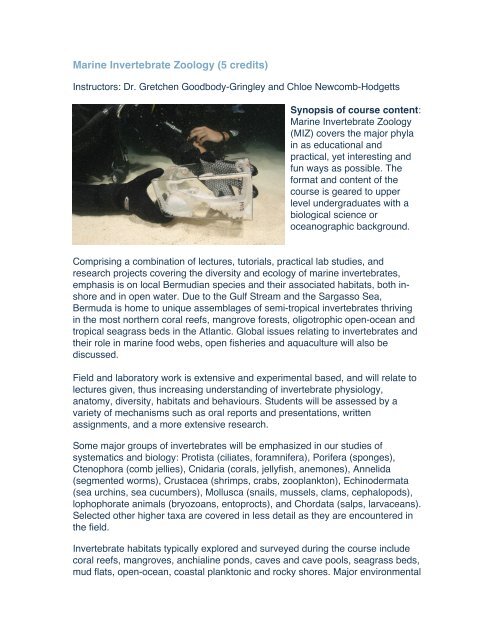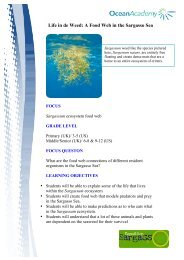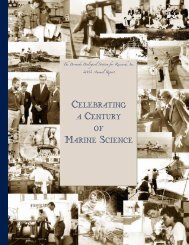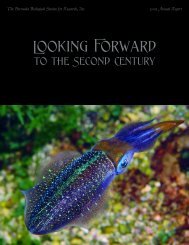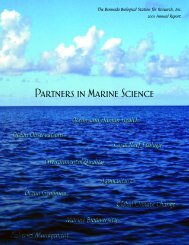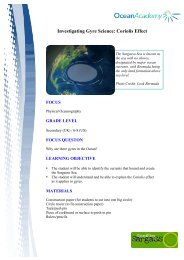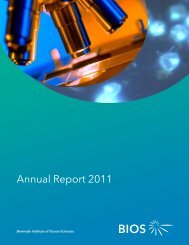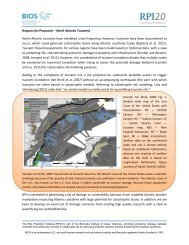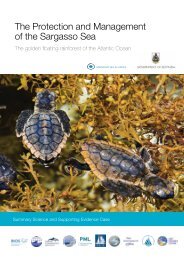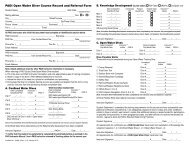Marine Invertebrate Zoology (5 credits) - Bermuda Institute of Ocean ...
Marine Invertebrate Zoology (5 credits) - Bermuda Institute of Ocean ...
Marine Invertebrate Zoology (5 credits) - Bermuda Institute of Ocean ...
You also want an ePaper? Increase the reach of your titles
YUMPU automatically turns print PDFs into web optimized ePapers that Google loves.
<strong>Marine</strong> <strong>Invertebrate</strong> <strong>Zoology</strong> (5 <strong>credits</strong>)<br />
Instructors: Dr. Gretchen Goodbody-Gringley and Chloe Newcomb-Hodgetts<br />
Synopsis <strong>of</strong> course content :<br />
<strong>Marine</strong> <strong>Invertebrate</strong> <strong>Zoology</strong><br />
(MIZ) covers the major phyla<br />
in as educational and<br />
practical, yet interesting and<br />
fun ways as possible. The<br />
format and content <strong>of</strong> the<br />
course is geared to upper<br />
level undergraduates with a<br />
biological science or<br />
oceanographic background.<br />
Comprising a combination <strong>of</strong> lectures, tutorials, practical lab studies, and<br />
research projects covering the diversity and ecology <strong>of</strong> marine invertebrates,<br />
emphasis is on local Bermudian species and their associated habitats, both inshore<br />
and in open water. Due to the Gulf Stream and the Sargasso Sea,<br />
<strong>Bermuda</strong> is home to unique assemblages <strong>of</strong> semi-tropical invertebrates thriving<br />
in the most northern coral reefs, mangrove forests, oligotrophic open-ocean and<br />
tropical seagrass beds in the Atlantic. Global issues relating to invertebrates and<br />
their role in marine food webs, open fisheries and aquaculture will also be<br />
discussed.<br />
Field and laboratory work is extensive and experimental based, and will relate to<br />
lectures given, thus increasing understanding <strong>of</strong> invertebrate physiology,<br />
anatomy, diversity, habitats and behaviours. Students will be assessed by a<br />
variety <strong>of</strong> mechanisms such as oral reports and presentations, written<br />
assignments, and a more extensive research.<br />
Some major groups <strong>of</strong> invertebrates will be emphasized in our studies <strong>of</strong><br />
systematics and biology: Protista (ciliates, foramnifera), Porifera (sponges),<br />
Ctenophora (comb jellies), Cnidaria (corals, jellyfish, anemones), Annelida<br />
(segmented worms), Crustacea (shrimps, crabs, zooplankton), Echinodermata<br />
(sea urchins, sea cucumbers), Mollusca (snails, mussels, clams, cephalopods),<br />
lophophorate animals (bryozoans, entoprocts), and Chordata (salps, larvaceans).<br />
Selected other higher taxa are covered in less detail as they are encountered in<br />
the field.<br />
<strong>Invertebrate</strong> habitats typically explored and surveyed during the course include<br />
coral reefs, mangroves, anchialine ponds, caves and cave pools, seagrass beds,<br />
mud flats, open-ocean, coastal planktonic and rocky shores. Major environmental
characteristics and factors effective in the different habitats will be discussed,<br />
examined and compared through field and laboratory experiments. Students will<br />
also become familiar with the distinguishing characteristics <strong>of</strong> the major<br />
invertebrate taxa and be able to identify higher taxa <strong>of</strong> marine invertebrates<br />
globally.<br />
Prerequisites <br />
All participants in the course must be able to snorkel and must be comfortable in<br />
the water, SCUBA certification is not essential, but is encouraged for maximum<br />
course benefits. Students are expected to be juniors majoring in either life<br />
science or environmental science, and to maintain 2.5 GPA.<br />
Assignments <br />
Students will be asked to maintain lab journals with records <strong>of</strong> their field and<br />
laboratory observations and experiments, and these will be graded. Students will<br />
also complete three detailed lab reports based on field and/or laboratory<br />
experiments conducted during the course, and an assignment using outside data<br />
sources such as an online database. These will be individually graded and will<br />
count towards your final result.<br />
Reading Material <br />
No set textbook is required for the<br />
semester, as BIOS’s library has an<br />
extensive collection <strong>of</strong> appropriate<br />
literature.<br />
Exams <br />
MIZ has a written mid term and a final exam, in addition to a final lab practical<br />
exam. Every effort is made to stagger exams so they don't overlap with CRE<br />
exams. However, the end <strong>of</strong> the semester is typically a busy time and students<br />
are strongly encouraged to study all along and to not leave their notebooks and<br />
final projects to the last minute.<br />
Term Papers and oral presentations <br />
Students are required to submit a final written paper that addresses a question<br />
and/or hypothesis about some biological, chemical or ecological aspect <strong>of</strong> an<br />
invertebrate <strong>of</strong> their choice; I will provide a tutorial on databases, literature<br />
searches and statistical analyses <strong>of</strong> data. The written report will follow the style <strong>of</strong><br />
a journal article, and include abstract, introduction, methods, results, discussion<br />
and reference sections.
Students will also give a 15 minute oral presentation on their database project at<br />
the end <strong>of</strong> the semester. These presentations follow a scientific meeting format<br />
with 12 minutes for the presentation and 3 minutes for questions.<br />
Final class grade will be based on: <br />
• Mid-Term Exam: 15% <br />
• Lab Exam: 10% <br />
• Final Exam: 20% <br />
• Database project and oral Assignment: 15% <br />
• Written Assignment X 3: 5% each <br />
• Lab Book: 5% <br />
• Lab Reports: 10% <br />
• Participation: 10%<br />
Photos by James B. Wood


